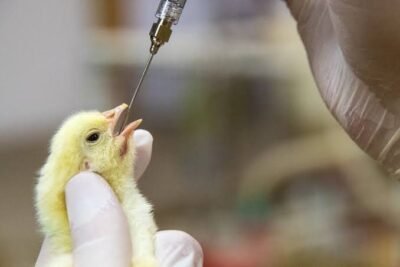Comprehensive Report: Challenges in Marek’s Disease Vaccination

Dr. Majed Hemed Al Sayeg / poultry pathologist / Australia
Introduction
Marek’s Disease (MD) is a highly impactful viral disease in poultry, characterised by immunosuppression and tumor formation. It causes substantial global economic losses exceeding USD 1 billion annually. Despite widespread vaccine use, outbreaks in vaccinated flocks highlight emerging challenges, particularly with hyper virulent Marek’s Disease Virus (HV-MDV) strains.
Recent Findings on Hyper virulent Strains
A 2023 study by Liu et al. investigated seven new MDV strains isolated from tumor-bearing chickens in China. Four of these were identified as HV-MDV strains (SDCW01, HNXZ05, HNSQ05, and HNSQ01). Key findings include:
High Pathogenicity: MD incidence reached 100% in some cases, with significant tumor formation.
Severe Immunosuppression: Marked atrophy in the thymus and bursa, coupled with hepatosplenomegaly.
High Mortality: Over 80% in the most virulent strains.
Vaccine Efficacy Analysis
The study compared the efficacy of four commercial MD vaccines (CVI988, HVT, CVI988+HVT, and 814) against the HV-MDV strain SDCW01:
Protection Indices (PI): None of the vaccines provided optimal protection, with PIs ranging from 28% (814) to 50% (CVI988+HVT).
Tumor Incidence: Tumors occurred in birds vaccinated with CVI988 or HVT, with incidences of 7.7% and 11.5%, respectively.
Survival Outcomes: Vaccines improved survival rates but failed to completely prevent disease or infection.

Key Challenges
Increased Virulence: Long-term immune pressure from vaccines has driven the evolution of HV-MDV strains, which now breach vaccine-induced immunity.
Limited Efficacy of Classical Vaccines: Traditional vaccines, including CVI988 and HVT, are less effective against emerging HV-MDV variants.
Geographic and Strain Variability: Regional diversity in MDV strains contributes to vaccine failures.
Incomplete Virus Neutralisation: Current vaccines prevent clinical symptoms but do not block infection or viral shedding, promoting virus evolution.
Strategic Recommendations
1- Development of Novel Vaccines:
Meq Gene Deletion Vaccines: Vaccines based on the deletion of the oncogenic Meq gene (e.g., SC9-1) show promise for enhanced protection.
Recombinant Vaccines: Leveraging genetic engineering to target conserved viral antigens.
Strain-Specific Vaccines: Tailored vaccines to match local MDV isolates.
2- Enhanced Surveillance:
Regular genomic sequencing and phylogenetic analysis to monitor virulence trends. Epidemiological studies to identify and track outbreaks of HV-MDV strains.
3- Integrated Management Strategies:
Combining vaccination with robust biosecurity measures to limit virus spread.
Genetic selection for MD-resistant poultry lines.
Global Collaboration:
Establishing international research initiatives to address MDV evolution and share vaccine development strategies.
Conclusion
The emergence of HV-MDV strains poses a significant challenge to the poultry industry. While current vaccines have reduced mortality, their limited efficacy against evolving MDV strains underscores the need for innovative approaches. Developing next-generation vaccines, enhancing biosecurity, and adopting integrated management practices are critical for sustainable control of Ma



